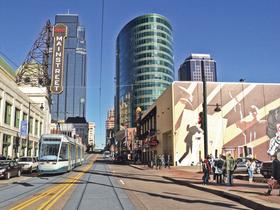If everything goes according to plan this election, Kansas City will be on track to build its first streetcar in under five years, from conceptual planning to first boarding. Maybe more impressive still, this relatively sprawling Midwestern town is this close to getting its first rail transportation without even a mild political dustup.

When you're a car-centric Midwestern city that hasn't had rail transportation in 50 years, swaying a general public -- the majority of which doesn't find transit useful or attractive -- can be the single hardest obstacle. But as Kansas City's streetcar project illustrates, you don't necessarily need to.
This month some 700 voters -- members of a downtown special taxing district surrounding the planned line -- will determine the fate of this project. They will decide whether to tax themselves and district shoppers -- through a combination of sales and property taxes -- a collective $10 million per year for 25 years. That amount, plus $18 million in funding the Kansas City Streetcar won from its metropolitan planning organization, will be enough to cover construction and operating costs for this two-mile downtown circulator.
Project sponsors applied for a TIGER IV grant earlier this year, but were passed over. That didn't stop them, or even slow them down much. The special taxing district will bring in 74 percent of the project's $100 million cost. Since the project will not rely on direct taxation from the general public, no larger community-wide vote will be necessary.
This election won't necessarily be full of intrigue. Residents of the special taxing district already voted by a wide margin to support the creation of the district back in August, leading project sponsors to believe they will support the tax as well. David Johnson, president of Streetcar Neighbors, said there have been some general NIMBY complaints, and some members of the taxing district have been vocally opposed, but that's about it.
"There’s been no funded opposition," he said. "I would say there’s really no formal opposition to it at all."
If voters approve the spending, the streetcar will break ground in 2013 and begin welcoming passengers in early 2015. The line is seen mainly as an economic development tool. And it seems to be working; three major residential projects along its path have come online since the plan was released, Johnson said.
The streetcar will run down Main Street, from a public market to the train station. The system will not charge riders a fare.
Project supporters have already received environmental approval, and engineering is underway.
If this seems like a snooze, compared to the drama we've seen in Cincinnati or Honolulu, that's the way project sponsors planned it, especially after several ultimately unsuccessful ballot issues in support of light rail in Kansas City.
"It was absolutely a political calculation," said Johnson. "It’s a good way to avoid a lot of the pitfalls."





